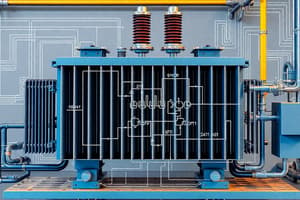Podcast
Questions and Answers
What is the primary focus of electrical engineering?
What is the primary focus of electrical engineering?
- Electricity, electronics, and electromagnetism (correct)
- Electromagnetic compatibility
- Transportation systems
- Robotics and automation
Which law relates voltage, current, and resistance in electrical circuits?
Which law relates voltage, current, and resistance in electrical circuits?
- Thevenin's Theorem
- Kirchhoff's Voltage Law
- Ohm's Law (correct)
- Faraday's Law
What is essential for automatic control systems in electrical engineering?
What is essential for automatic control systems in electrical engineering?
- Thermal dynamics
- Quantum mechanics
- Feedback systems (correct)
- Hydraulic systems
Which of the following is NOT an application of electrical engineering?
Which of the following is NOT an application of electrical engineering?
What does the power factor in power systems signify?
What does the power factor in power systems signify?
Which programming languages are commonly used in electrical engineering for embedded systems?
Which programming languages are commonly used in electrical engineering for embedded systems?
What role do simulation software tools play in electrical engineering?
What role do simulation software tools play in electrical engineering?
Which emerging technology involves the integration of digital technology into electricity distribution?
Which emerging technology involves the integration of digital technology into electricity distribution?
Flashcards are hidden until you start studying
Study Notes
Overview of Electrical Engineering
- Definition: Branch of engineering focused on electricity, electronics, and electromagnetism.
- Applications: Power systems, telecommunications, control systems, electronics, and signal processing.
Key Areas of Study
-
Circuit Theory
- Fundamental concepts: voltage, current, resistance, and power.
- Ohm’s Law: V = IR (Voltage = Current × Resistance).
- Circuit analysis techniques: KVL, KCL, nodal and mesh analysis.
-
Electronics
- Study of semiconductor devices (diodes, transistors).
- Amplifiers and operational amplifiers.
- Analog and digital circuit design.
-
Power Systems
- Generation, transmission, and distribution of electrical energy.
- Alternating Current (AC) vs. Direct Current (DC).
- Power factor and its significance.
-
Control Systems
- Automatic control theory and feedback systems.
- Transfer functions, stability, and response analysis.
- PID controllers and their applications.
-
Signal Processing
- Analog and digital signal processing techniques.
- Fourier transforms and signal representation.
- Applications in communications and audio processing.
-
Electromagnetics
- Study of electric and magnetic fields and their interactions.
- Maxwell's equations and their applications.
- Wave propagation and transmission lines.
Important Tools and Techniques
- Simulation Software: SPICE, MATLAB, and Simulink for circuit design and analysis.
- Measurement Instruments: Multimeters, oscilloscopes, and spectrum analyzers.
- Programming Languages: C, C++, Python for embedded systems and automation.
Emerging Technologies
- Renewable Energy Systems: Solar, wind, and energy storage technologies.
- Smart Grids: Integration of digital technology in electricity distribution.
- Internet of Things (IoT): Connecting devices for data exchange and automation.
Professional Skills
- Problem-solving and analytical skills.
- Strong understanding of physics and mathematics.
- Communication skills for collaboration and reporting.
Career Paths
- Electrical engineer in industries like power, telecommunications, automotive, and aerospace.
- Research and development roles in academic and government institutions.
- Consulting and project management positions.
Overview of Electrical Engineering
- Branch of engineering that specializes in electricity, electronics, and electromagnetism.
- Wide-ranging applications include power systems, telecommunications, control systems, electronics, and signal processing.
Key Areas of Study
-
Circuit Theory
- Key concepts include voltage (V), current (I), resistance (R), and power.
- Ohm’s Law formula: V = I × R.
- Analysis techniques involve Kirchhoff’s Voltage Law (KVL), Kirchhoff’s Current Law (KCL), and methods like nodal and mesh analysis.
-
Electronics
- Focuses on semiconductor devices, including diodes and transistors.
- Important components include amplifiers and operational amplifiers.
- Emphasis on both analog and digital circuit design.
-
Power Systems
- Involves the generation, transmission, and distribution of electrical energy.
- Differentiates between Alternating Current (AC) and Direct Current (DC).
- Highlights the importance of power factor in system efficiency.
-
Control Systems
- Centers on automatic control theory and feedback mechanisms.
- Utilizes transfer functions to analyze system stability and response.
- PID (Proportional-Integral-Derivative) controllers are essential for feedback systems.
-
Signal Processing
- Explores techniques for both analog and digital signal processing.
- Fourier transforms play a crucial role in signal representation and analysis.
- Applications extend to communication systems and audio processing.
-
Electromagnetics
- Examines electric and magnetic fields and their interactions.
- Utilizes Maxwell's equations to describe electromagnetic phenomena.
- Studies wave propagation and the behavior of transmission lines.
Important Tools and Techniques
- Simulation Software: Commonly used tools include SPICE, MATLAB, and Simulink for circuit design and simulation.
- Measurement Instruments: Essential tools include multimeters, oscilloscopes, and spectrum analyzers for testing and diagnostics.
- Programming Languages: Proficiency in C, C++, and Python is crucial for developing embedded systems and automation solutions.
Emerging Technologies
- Renewable Energy Systems: Involves harnessing energy from solar, wind, and advanced energy storage solutions.
- Smart Grids: Refers to the integration of digital technologies for improved electricity distribution and management.
- Internet of Things (IoT): Focuses on connecting various devices for enhanced data exchange and automation capabilities.
Professional Skills
- Strong problem-solving and analytical capabilities are vital in addressing engineering challenges.
- A solid foundation in physics and mathematics underpins electrical engineering concepts.
- Effective communication skills are necessary for teamwork and reporting findings.
Career Paths
- Opportunities for electrical engineers span industries such as power, telecommunications, automotive, and aerospace.
- Roles include research and development positions in academic institutions and government agencies.
- Consulting and project management roles are also prevalent, focusing on various engineering projects.
Studying That Suits You
Use AI to generate personalized quizzes and flashcards to suit your learning preferences.




